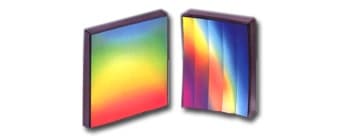Diffraction Grating

Hitachi Diffraction Gratings Analyze a Variety of Radiations Ranging from X-rays to Infrared.
Hitachi diffraction gratings are adopted in a wide range of scientific and industrial fields, e.g. large spectrograph for photobiological research and Spectrophotometers for extreme ultraviolet explorer.
* These gratings are available in North America and Europe.
Features
The diffraction gratings capable of analyzing a variety of radiations ranging from soft X-rays to far infrared are now expanding their application areas as optical elements indispensable for spectroscopy.
The diffraction gratings developed by Hitachi have been used in various application areas, and are now highly evaluated as the world's foremost optical elements.
For example, a total of 36 diffraction gratings having a size of 15 × 15 cm and arranged in a mosaic pattern, are adopted in the large spectrograph used in the Okazaki National Research Institutes, National Institute for Basic Biology.
The spectrograph has successfully realized the world's largest artificial rainbow whose intensity is 20 times the sunlight energy right above the equator.
Furthermore, the Hitachi plane diffraction gratings consisting of varied space grooves have also been adopted in the Spectrophotometers of the extreme ultraviolet explorer scheduled to be launched by NASA of the U.S.A. Hitachi has developed the reflection plane gratings and concave gratings to meet such most-advanced technological fields as exemplified above.
These gratings are available in a wide variety of models to meet your diversified needs.

Large spectrograph at the Institute for Basic Biology
- Control computer
- Power supply room
- Condensing mirror
- 30 kW xenon lamp
- Deflection mirror
- Optical fiber room
- Operation room
- Illumination room
- Diffraction grating

“Flying into the Rainbow" by Naoya Sakagami (In the arrival lobby of New Haneda Airport)
An art object representing a rainbow under the dome, which was created using the Hitachi diffraction grating parts.
* These gratings are available in North America and Europe.
Plane Diffraction Gratings

A wide variety of high performance, mechanically-ruled diffraction gratings.
- The ruling engine equipped with a highly sensitive laser interferometer is able to rule grating grooves with ultrahigh accuracy, and realizes high resolution spectroscopic instruments.
- Burnishing process, by using a diamond tool, serves to form triangularly shaped echelette grooves whose surfaces are extremely smooth yielding minimum stray light.
- The grooves, having an exact blaze angle, can be formed by selecting an appropriate diamond tool and measuring the groove profiles with a scanning electron microscope. These processes allow the grating to provide a highly efficient diffraction efficiency in the designed wavelength region.
- Grating grooves having 2 or more different blaze anoles can be combined on a single diffraction grating. This structure allows for broader wavelength coverage.
- A variety of diffraction gratings with variable spaced grooves and shapes are manufactured.
Concave Diffraction Grating

From X-rays to Infrared! Gratings can now be designed to meet specific requirements.
-
Coma-type aberration-corrected concave grating for high resolution Seya-amioka monochromator:
This grating eliminates the coma-type aberration of the Seya-Namioka monochromator, which has been most widely used in monochromators with concave gratings that provide high resolution. Hitachi is manufacturing a wide variety of aberration-corrected gratings for Seya-Namioka monochromator which cover a wavelength range from the vacuum ultra-violet to the near infrared region. -
Diffraction gratings for compact, high efficiency monochromator:
These gratings are designed for normal incidence mounting. They reduce aberrations and at the same time increase the efficiency of light intensity.
A as a result, a high quality of image focusing of the concave grating is available. -
Diffraction gratings for flat field spectrograph:
Variable space grooves enable flat-field image focusing of concave grating spectrograph. The spectrograph permits simultaneous measurement of multi-wavelength spectra when combined with a linear array detector. Gratings are designed optimally for the grazing-incidence optical system (for soft X-ray) and the normal incidence optical system (for VIS-UV ray), respectively. -
Diffraction gratings for multi wavelength optical communication:
A compact and efficient aberration corrected concave grating is manufactured for transmitting multiple wavelength light beams through an optical fiber and acts to separate the beams at the receiving terminal. -
Diffraction gratings for soft X-rays:
Highly dispersive concave gratings for grazing-incidence mounting are available especially used for synchrotron radiation and extreme ultra-violet applications. These gratings are very effective for the application of soft x-rays whose reflectance is extremely low on a metal surface.
The basics of spectrophotometer, from "What can an ultraviolet and visible spectrophotometer Do?" to "Structure of a spectrophotometer."
